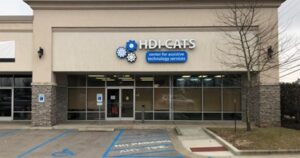Adherence of cell-free DNA noninvasive prenatal screens to ACMG recommendations in providing patient education resources
Research Brief by Stephanie Meredith & Mark Leach
Cell-free DNA prenatal screens (also known as NIPS or NIPT) were released in the US by commercial labs eight years ago as screening tests for conditions such as Down syndrome, Trisomy 18, and Trisomy 13. When these screens were originally released in 2011, they were largely covered in the media as non-invasive prenatal diagnostic tests that could detect conditions with a simple blood draw. However, even though cell-free DNA noninvasive prenatal screens are more sensitive than traditional screening tests, there are still chances for false positives and, less often, false negatives. Therefore, they are considered screening tests and are not actually diagnostic (Mozersky, 2012). The introduction of this new technology and some of the confusion surrounding it prompted national medical and genetics societies to issue guidelines about the administration of these screens.
The article “Adherence of cell-free DNA noninvasive prenatal screens to ACMG recommendations” published in Genetics in Medicine in April 2019 reviews the adherence of commercial labs to all the American College of Medical Genetics and Genomics (ACMG) recommendations for cell-free DNA noninvasive prenatal screens (Skotko et al., 2019). This HDI Research Brief aims to review what the Shotko et al. study revealed about the adherence of labs in following the ACMG recommendations for the provision of patient resources.
The article “Adherence of cell-free DNA noninvasive prenatal screens to ACMG recommendations” published in Genetics in Medicine in April 2019 reviews the adherence of commercial labs to all the American College of Medical Genetics and Genomics (ACMG) recommendations for cell-free DNA noninvasive prenatal screens (Skotko et al., 2019). This HDI Research Brief aims to review what the Shotko et al. study revealed about the adherence of labs in following the ACMG recommendations for the provision of patient resources.
Original article by Brian G. Skotko, MD, MPP, Megan A. Allyse, PhD, Komal Bajaj, MD, MS-HPEd, Robert G. Best, PhD, Susan Klugman, MD, Mark Leach, JD, MA, Stephanie Meredith, MA, Marsha Michie, PhD, Katie Stoll, MS & Anthony R. Gregg, MD, MBA published in Genetic in Medicine (GIM)
Download here.



